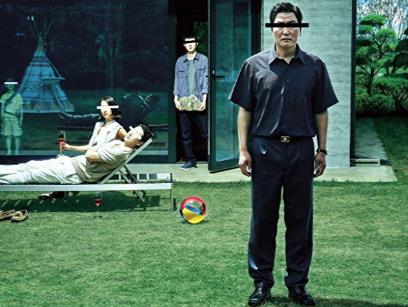Image: one version of the poster for Parasite
“How many top Cannes titles will be seen to any significant extent in American theatres?” asked the Hollywood Reporter’s Todd McCarthy in a piece titled ‘A Quiet Cannes Film Festival’s Grasp at Relevance’. It was one of a slate of articles from noted US publications ranging from IndieWire to The Wrap that lament the apparent decline of the festival and of cinema itself.
Beyond making the arbitrary point that the hype for Cannes was less than that which surrounded the series finale of Game of Thrones, it is not entirely clear why these articles exist.
This year’s festival followed a very successful 2018 festival which saw the Palme d’Or winner (the beautiful, humanist drama Shoplifters), Grand Prix and Jury Prize winners (BlacKkKlansman and Capernaum respectively) alongside the Best Director winner (Pawel Pawlikowski for the stunning Cold War) all receive year long critical and commercial success culminating in Oscar nominations.
The 2019 Cannes winners look to be potentially even stronger, and include some historical firsts.
Bong Joon-ho’s family tragicomedy Parasite made him the first South Korean director to ever win the Palme d’Or.
Mati Diop, the first black female director to ever have a film included in the official line-up, received the Grand Prix for her ghost story Atlantics.
Diop’s film was one of three female directed films to receive an award, which is better than usual for the festival.
Jessica Hausner’s Little Joe took Best Actress and Céline Sciamma’s Portrait of a Lady on Fire was awarded Best Screenplay. Come the end of the year, expect the latter to be included on a whole lot of ‘Best of 2019’ lists.
As for the concerns encapsulated in IndieWire’s Eric Kohn asking “if Cannes triumphs and the world barely notices, does it make a sound?”, it’s worth noting that three winners are in the Sydney Film Festival just a week away. Parasite is selling fast and director Bong Joon-ho will be present. Pain and Glory by Pedro Almodóvar’s has the Best Actor award and the weird Brazilian magic realist western Bacurau from Kleber Mendonça Filho and Juliano Dornelles has the Jury Prize. Again, Filho is a guest.
Additionally, Atlantics has been acquired by Netflix which at least ensures it the opportunity to be widely viewed, even if the screen is smaller. .
For most of these American publications, it seems that Cannes can only ever be considered relevant if its line-up has a distinctly Hollywood leaning, but the 2019 line-up delivered on that front too.
Both Quentin Tarantino and Terrence Malik, two of the most notable American filmmakers alive, received positive notices for their official competition entries. The former’s film, Once Upon a Time in Hollywood, will undoubtedly be one of the most talked about movies of the year. Meanwhile, the latter’s WWII drama A Hidden Life, despite a three-hour runtime and a self-evident lack of accessibility, was acquired by Fox Searchlight for a staggering $14 million.
Additionally, the festival saw the launch of Elton John biopic Rocketman, joyously reviewed for Screenhub by Mel Campbell. In this post Bohemian Rhapsody world it is probably going to be a box office giant, as well as The Lighthouse from critical favourite, emerging director Robert Eggers.
For all the hand wringing about the commercial prospects of Cannes entries, it is undeniable that the festival brings these films worldwide attention that would be impossible through virtually any other avenue. Cannes is the reason that a movie like Shoplifters grossed over $72 million worldwide. The films it premiered this year will be viewed and discussed all over the world and this is reason enough for the festival to still be considered highly relevant.
Cannes relies on a unique combination of a competitive festival with a profound impact on the art of cinema and a marketplace. It is true that the very nature of the sales system is changing as streaming takes over and other festivals boost their markets, but Cannes is still at the very core of the arthouse movement. That has never relied on the tastes of American cinemagoers.





